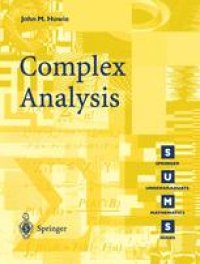
Ebook: Complex Analysis
- Tags: Analysis, Functions of a Complex Variable
- Series: Springer Undergraduate Mathematics Series
- Year: 2003
- Publisher: Springer-Verlag London
- Edition: 1
- Language: English
- pdf
Complex analysis is one of the most attractive of all the core topics in an undergraduate mathematics course. Its importance to applications means that it can be studied both from a very pure perspective and a very applied perspective. This book takes account of these varying needs and backgrounds and provides a self-study text for students in mathematics, science and engineering. Beginning with a summary of what the student needs to know at the outset, it covers all the topics likely to feature in a first course in the subject, including: complex numbers, differentiation, integration, Cauchy's theorem, and its consequences, Laurent series and the residue theorem, applications of contour integration, conformal mappings, and harmonic functions. A brief final chapter explains the Riemann hypothesis, the most celebrated of all the unsolved problems in mathematics, and ends with a short descriptive account of iteration, Julia sets and the Mandelbrot set. Clear and careful explanations are backed up with worked examples and more than 100 exercises, for which full solutions are provided.
Complex analysis is one of the most attractive of all the core topics in an undergraduate mathematics course. Its importance to applications means that it can be studied both from a very pure perspective and a very applied perspective. This book takes account of these varying needs and backgrounds and provides a self-study text for students in mathematics, science and engineering. Beginning with a summary of what the student needs to know at the outset, it covers all the topics likely to feature in a first course in the subject, including: complex numbers, differentiation, integration, Cauchy's theorem, and its consequences, Laurent series and the residue theorem, applications of contour integration, conformal mappings, and harmonic functions. A brief final chapter explains the Riemann hypothesis, the most celebrated of all the unsolved problems in mathematics, and ends with a short descriptive account of iteration, Julia sets and the Mandelbrot set. Clear and careful explanations are backed up with worked examples and more than 100 exercises, for which full solutions are provided.
Complex analysis is one of the most attractive of all the core topics in an undergraduate mathematics course. Its importance to applications means that it can be studied both from a very pure perspective and a very applied perspective. This book takes account of these varying needs and backgrounds and provides a self-study text for students in mathematics, science and engineering. Beginning with a summary of what the student needs to know at the outset, it covers all the topics likely to feature in a first course in the subject, including: complex numbers, differentiation, integration, Cauchy's theorem, and its consequences, Laurent series and the residue theorem, applications of contour integration, conformal mappings, and harmonic functions. A brief final chapter explains the Riemann hypothesis, the most celebrated of all the unsolved problems in mathematics, and ends with a short descriptive account of iteration, Julia sets and the Mandelbrot set. Clear and careful explanations are backed up with worked examples and more than 100 exercises, for which full solutions are provided.
Content:
Front Matter....Pages i-xi
What Do I Need to Know?....Pages 1-18
Complex Numbers....Pages 19-34
Prelude to Complex Analysis....Pages 35-49
Differentiation....Pages 51-78
Complex Integration....Pages 79-106
Cauchy’s Theorem....Pages 107-117
Some Consequences of Cauchy’s Theorem....Pages 119-136
Laurent Series and the Residue Theorem....Pages 137-152
Applications of Contour Integration....Pages 153-181
Further Topics....Pages 183-194
Conformal Mappings....Pages 195-215
Final Remarks....Pages 217-224
Solutions to Exercises....Pages 225-253
Back Matter....Pages 255-260
Complex analysis is one of the most attractive of all the core topics in an undergraduate mathematics course. Its importance to applications means that it can be studied both from a very pure perspective and a very applied perspective. This book takes account of these varying needs and backgrounds and provides a self-study text for students in mathematics, science and engineering. Beginning with a summary of what the student needs to know at the outset, it covers all the topics likely to feature in a first course in the subject, including: complex numbers, differentiation, integration, Cauchy's theorem, and its consequences, Laurent series and the residue theorem, applications of contour integration, conformal mappings, and harmonic functions. A brief final chapter explains the Riemann hypothesis, the most celebrated of all the unsolved problems in mathematics, and ends with a short descriptive account of iteration, Julia sets and the Mandelbrot set. Clear and careful explanations are backed up with worked examples and more than 100 exercises, for which full solutions are provided.
Content:
Front Matter....Pages i-xi
What Do I Need to Know?....Pages 1-18
Complex Numbers....Pages 19-34
Prelude to Complex Analysis....Pages 35-49
Differentiation....Pages 51-78
Complex Integration....Pages 79-106
Cauchy’s Theorem....Pages 107-117
Some Consequences of Cauchy’s Theorem....Pages 119-136
Laurent Series and the Residue Theorem....Pages 137-152
Applications of Contour Integration....Pages 153-181
Further Topics....Pages 183-194
Conformal Mappings....Pages 195-215
Final Remarks....Pages 217-224
Solutions to Exercises....Pages 225-253
Back Matter....Pages 255-260
....